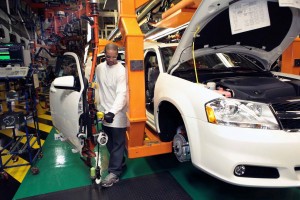General Motors said Thursday that it will eliminate one of two shifts at a transmission plant in Warren, Michigan. The announcement is expected to put about 300 workers on indefinite layoff, or roughly half the plant’s total hourly workforce.
The move comes at a time when U.S. new vehicle sales are faltering after three record years – GM also on Thursday reporting its May numbers were off about 1% compared to year-earlier sales. The decline has been especially severe on the passenger car side of the ledger, as millions of Americans shift from sedans, coupes and sports cars to SUV, crossovers and pickups.
GM already has been responding by trimming production of slower-selling vehicles, such as the Chevrolet Malibu, so “Recent actions to reduce passenger car production have caused us to adjust transmission production,” the maker said in a statement.
In all, the largest of the Detroit Big Three has eliminated five factory work shifts since last November, when analysts and industry planners began to declare the downward momentum in car sales more than a temporary blip.
In all, about 5,000 hourly workers have been idled by those moves which have impacted factories including ones in Lordstown, Ohio, Detroit and two in Lansing, Michigan. However, some of the production cuts are temporary and at least 700 workers are expected to be brought back as operations ramp back up next year.
(GM’s sales were down 2.2% as the industry remained flat in May. To see the results, Click Here.)
GM is by no means the only automaker adjusting production and making cuts, however. A report by outplacement firm Challenger, Gray & Christmas shows that the auto industry had expected to cut 20,271 jobs last month. The vast majority of those came at Ford. The second-largest automaker suffered a 5.1% dip in sales during the first four months of 2017, though it reported an unexpected 2.2% increase for May.
But while May is likely to bring a slight reprieve in the downward sales spiral for the industry overall, that comes at a serious cost. According to a report by Edmunds.com, incentive spending rose sharply last month – on financing deals by a whopping 33%.
Incentives have helped offset the fact that new car prices have been rising fast over the last several years. While last month’s average transaction prices – what customers actually pay for a vehicle, all in –were up from a year ago, they actually dipped $266 from April 2017, reported Kelley Blue Book.
(Popularity of leasing causing headaches for auto industry. Click Here to learn why.)
Whether heftier incentives will be able to keep the market moving and forestall further job cuts is far from certain. Automakers are struggling to find the right balance between increased incentives and sales, knowing that if they get too aggressive with givebacks they could touch off the sort of profit-eating spiral that nearly destroyed two of the domestic manufacturers in the lead-up to the Great Recession, both GM and Chrysler surviving bankruptcy only with the help of federal bailouts.
Both GM and Ford have been quick to adjust production levels to try to keep down inventories of unsold cars. They have also trimmed production to reflect a shift in strategy away from low-profit fleets, especially to daily rental companies.
The smallest of the Detroit automakers, Fiat Chrysler Automobiles, has also made some sharp cuts in recent months, including the closure of assembly plants in Belvidere, Illinois, and Sterling Heights, Michigan. Both plants were producing slow-selling sedan models. They are in the midst of being converted to produce light truck models expected to boost demand.
Ford is making a similar changeover at the Michigan Assembly Plant in Wayne, Michigan that had produced low-demand models such as the Ford Focus. It will soon produce new light truck models, including the reborn Ford Bronco SUV and Ranger pickup.
Ford took heat from then-candidate Donald Trump for its decision to move production of its small cars to Mexico. But the maker fired back that it was replacing those models with trucks likely to generate higher demand and more jobs.
(Have sales of SUVs and CUVs hit their peak? Click Here for the story.)




I’d like to see how profits compare between fleet sales and retail sales when you subtract amortized advertising and incentives.